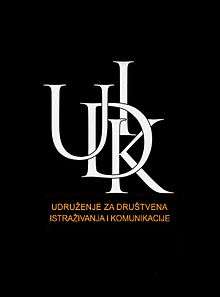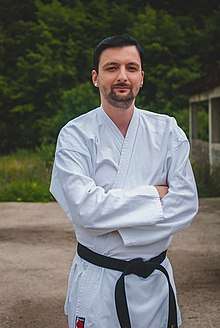UDIK
 | |
| Formation | October 2013 |
|---|---|
| Type | Non-governmental organization |
| Headquarters | Sarajevo, Bosnia and Herzegovina |
Region served | Balkans |
Coordinator | Edvin Kanka Ćudić |
| Website | www.udik.org |
UDIK, the Association for Social Research and Communications (Bosnian, Croatian, Serbian, Montenegrin: Udruženje za društvena istraživanja i komunikacije/ Удружење за друштвена истраживања и комуникације) commonly known as UDIK, is a Bosnian regional non-governmental organization with offices in Sarajevo and Brčko.[1][2][3][4] It was founded in 2013 by Edvin Kanka Ćudić that aimed to gather facts, documents, and data on genocide, war crimes, and human rights violations in Bosnia and Herzegovina and the former Yugoslavia.[5]
Human rights activities

UDIK was founded in 2013 by Edvin Kanka Ćudić. It aimed to gather facts, documents, and data on genocide, war crimes, and human rights violations in Bosnia and Herzegovina and former Yugoslavia.[6] UDIK works across national boundaries to assist post-conflict societies within the region reestablish the rule of law and deal with past human rights abuses. UDIK also implements a victim-oriented Transitional Justice programme with three principal components[7]:
- Documentation
- Justice and institutional reform
- Culture of remembrance
UDIK was made up of independent members, intellectuals and professionals from different academic disciplines.
Activism
Commemorations
_location_map.svg.png)
Since 2013, UDIK has organized a large number of commemorations to the victims of past war in the former Yugoslavia (1991-2001). UDIK calls this commemorations the Living monument. The ceremonies were organized in Bosnia and Herzegovina (Sarajevo, Tuzla, Brčko, Zenica, Višegrad, Foča), Croatia (Zagreb, Vukovar) and Serbia (Belgrade, Prijepolje).[10][11][12] Thanks to this initiative, for the first time, many commemorations were organized. These commemorations were related to crimes against civilian victims of Bosniaks, Serbs and Croats.
The activities that got the most attention were the commemoration of the non-Bosniak victims of the crimes committed in Sarajevo's Kazani and commemorations of Serbian victims of the crimes in Operation Storm organized in Sarajevo and Zagreb.
In May 2015, Federal Ministry of Interior of the Bosnia and Herzegovina banned the Sarajevo's commemoration of Serbian victims of the crimes committed in Operation Storm. In May 2016 the same commemoration was banned by Ministry of the Interior of the Republic of Croatia, but in the end it was held in Zagreb with high police security.[13]
Allegations of bias
The criticism generally falls into the category of alleged bias, often in response to UDIK's commemorations to the Yugoslav wars victims. Bias allegations include the organization's insistence on war crimes on Serbs or Croats which was committed by the ARBiH. Bosniak right-wing media in Bosnia think that certain crimes against Serbs or Croats which was committed by the ARBiH were legitimate military targets against the aggressor while UDIK believes that Bosniaks must take responsibility for the killings of civilians in those crimes.[14][15][16]
On the other hand, Serbian nationalists believe that the UDIK is Soros-funded advocacy group who organizes commemorations not to express sympathy, but rather to gather political points.[17]
Researches
Central register of memorials of the Yugoslav wars (1991–2001)
In December 2015, UDIK team began to research and compile a register of memorials for victims of the Yugoslav wars (1991-2001) including Bosniaks, Croats, Serbs and Others who were killed or disappeared during the armed conflicts in Yugoslavia (1991–2001) with the aim of creating the Central register of memorials on the territory of the former Socialist Federative Republic of Yugoslavia (SFRJ) that would serve to curb attempts at historical revisionism and manipulative use of the numbers of victims.[18]
The register is based on analysis of documents from municipalities, cities, museums, tourist organizations, Islamic Community of Bosnia and Herzegovina, Serbian Orthodox Church, ministries of veterans including newspaper reports from the period, internet, publications, associations of veterans and families of the dead, etc.[19][20]
In 2016, UDIK published the first results of the Central rеgister of memorials for Bosnia and Herzegovina, listing more than 2.100 memorials to the victims of Bosnian War (1992-1995). Next year (2017), UDIK also published more than 1.200 memorials built in Croatia dedicated to the victims of Homeland War (1991-1995).[21][22]
The register also includes examples of the controversial memorials that were built after 1991 in the countries of the former Yugoslavia, and which glorify fascism and hatred among the people of the former Yugoslavia.[23][24]
The Central register of memorials of the Yugoslav wars (1991–2001) is still the only register of memorials to victims of the Yugoslav wars on the territory of the countries of the former Yugoslavia.[25]
Publications about war crimes
UDIK every year publishes documents about war crimes in Bosnia and Herzegovina. UDIK has published extensively on subjects such as war crimes, massacres and human rights violations from 1992 to 1995 in Foča, Višegrad, Sarajevo's Grbavica, Trusina, etc.[26][27]
UDIK's publications about war crimes in Bosnia and Herzegovina are available at the Library of Congress in United States.[28]
Cooperations
In 2015, UDIK co-operated with the ICMP on the occasion of marking the International Day of the Disappeared, a commemoration designed to raise public awareness about the issue of missing persons from armed conflict and human rights abuses.[29]
In 2017, UDIK co-operated with the Sarajevo Film Festival in the Dealing with the Past program at the True Stories Market.[30]
References
- ↑ "Performans ispred katedrale u znak sjećanja na Kazane, Odati počast svim žrtvama - Klix". klix.ba. 2015-10-25. Retrieved 2016-10-15.
- ↑ "U BiH nakon rata podignuto 2500 spomenika - Al Jazeera Balkan". balkans.aljazeera.net. 2016-06-20. Retrieved 2016-10-15.
- ↑ "Spomenici miru nisu u interesu bh. vlasti - Radio Slobodna Evropa". www.slobodnaevropa.org. 2016-08-27. Retrieved 2016-10-15.
- ↑ "UDIK marks 23rd anniversary of kiling of civilians in Trusina near Konjic -Fena". www.fena.ba. 2016-04-15. Retrieved 2016-10-19.
- ↑ "Da li je Srbija slobodna zemlja za ratne zločince". radioslobodnaevropa.org. 2017-06-18. Retrieved 2017-06-30.
- ↑ "Da li je Srbija slobodna zemlja za ratne zločince". radioslobodnaevropa.org. 2017-06-18. Retrieved 2017-06-30.
- ↑ "About us". udik.org. 2015-10-25. Retrieved 2017-07-03.
- ↑ "Living monument". UDIK. 14 February 2014. Retrieved 14 February 2014.
- ↑ "Nacionalizam ubija, poručili aktivisti iz Sarajeva -Klix". www.klix.ba. 2013-11-09. Retrieved 2017-06-29.
- ↑ "UDIK odao počast žrtvama stradalim na Kazanima: Važno je sjećati se". informativa.ba. 2015-10-25. Retrieved 2017-07-03.
- ↑ "Sjećanje na dan kada je ubijena tuzlanska mladost". nap.ba. 2015-05-25. Retrieved 2017-07-03.
- ↑ "UDIK u Brčkom obilježio Dan bijelih traka". brcko.tv. 2016-05-30. Retrieved 2017-07-03.
- ↑ "Tri osobe povrijeđene na protestu protiv veličanja Oluje u Zagrebu". rtrs.tv. 22 August 2016. Retrieved 4 May 2017.
- ↑ "Kazani su povod bošnjačke pobjede". saff.ba. 22 August 2016. Retrieved 4 May 2017.
- ↑ "Dva Srbina iz Kravice kao 8732 žrtve iz Srebrenice". novihorizonti.ba. 22 August 2016. Retrieved 4 May 2017.
- ↑ "Zašto se UDIK nije sjetio žrtava Ahmića i Trusine na današnji dan?". opsadasarajeva.blogspot.ba. 22 August 2016. Retrieved 4 May 2017.
- ↑ "Marking 23th Anniversary of Srebrenica Massacre: Lessons still not learned". balkanpost.com. 22 August 2016. Retrieved 4 May 2017.
- ↑ "UDIK: U BiH izgrađeno je više od 2.100 spomenika koji su posvećeni borcima i civilima - novi.ba". novi.ba. 2016-08-22. Retrieved 2016-10-15.
- ↑ "U BiH nakon rata podignuto 2500 spomenika – Al-Jazeera Balkans". balkans.aljazeera.net. 2016-08-22. Retrieved 2016-10-15.
- ↑ "U Sarajevu predstavljanje Centralne evidencije spoemenika u BiH - vijesti.ba". vijesti.ba. 2016-08-22. Retrieved 2016-10-15.
- ↑ "Ćudić:U RS ima 50 posto manje spomen obilježja nego u FBiH". fokus.ba. Retrieved 4 May 2017.
- ↑ "Spomenici uglavnom ukazuju na patnju i stradanje samo jednog naroda". klix.ba. Retrieved 4 May 2017.
- ↑ "Ćudić:U RS ima 50 posto manje spomen obilježja nego u FBiH". fokus.ba. Retrieved 4 May 2017.
- ↑ "Spomenici uglavnom ukazuju na patnju i stradanje samo jednog naroda". klix.ba. Retrieved 4 May 2017.
- ↑ "U BiH nakon rata podignuto 2500 spomenika – Al-Jazeera Balkans". balkans.aljazeera.net. 2016-08-22. Retrieved 2016-10-15.
- ↑ "Predstavljena knjiga o ratnom zločinu u Trusini". dnevni-list.ba. 2016-08-22. Retrieved 2016-10-15.
- ↑ "Promovirana publikacije: Ratni zločini na Grbavici-presude". vijesti.ba. 2016-08-22. Retrieved 2016-10-15.
- ↑ "LC Online Catalog - Library of Congress". catalog.loc.gov. 2016-08-22. Retrieved 2016-10-15.
- ↑ - ICMP "International Day of the Disappeared 2015" Check
|url=value (help). icmp.int. 2016-08-22. Retrieved 2016-10-15. - ↑ "True Stories Market - Sarajevo Film Festival". sff.ba. 2016-08-22. Retrieved 2016-10-15.
External links
- Official website
- (in English) Organisation Data TACSO
- (in English) Organisation Data Insight on Conflict
- (in English) Organisation Data Ana Lindh Foundation
- (in English) Organisation Data Transconflict
.jpg)